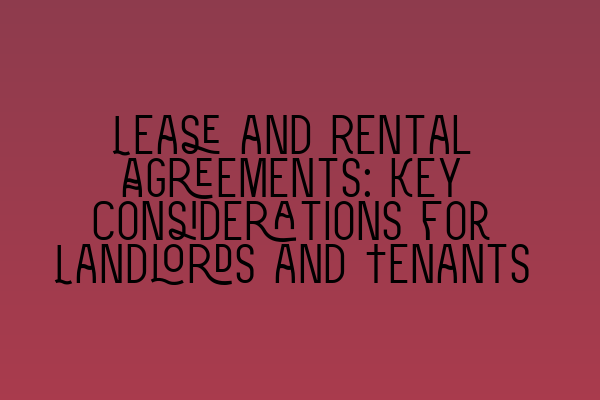Lease and rental agreements are essential documents that govern the relationship between landlords and tenants. Whether you are a landlord looking to draft an agreement or a tenant seeking to understand your rights and obligations, it is crucial to have a comprehensive understanding of the key considerations involved in these agreements. In this blog post, we will explore the important elements that both landlords and tenants need to bear in mind when entering into lease and rental agreements.
1. Clear and Specific Terms
One of the most critical aspects of any lease or rental agreement is to ensure that the terms are clear and specific. This includes clearly stating the property’s address, duration of the agreement, rental amount and payment terms, and any additional fees or charges. By providing specific details, both parties can avoid potential misunderstandings or disputes in the future.
It is also essential to include other key terms such as the responsibilities of the landlord and tenant, including maintenance obligations, utilities, and any restrictions or rules pertaining to the property. Additionally, consider including provisions regarding potential rental increases, notice periods for termination, and any penalties for non-compliance.
2. Security Deposits
Landlords often request security deposits from tenants to protect against any damage or unpaid rent. When including a security deposit clause in your agreement, ensure that you specify the amount required, how and when it will be returned, and any deductions that may be made for damages or unpaid rent.
Remember, there may be legal restrictions on the amount of security deposit you can request, so it is crucial to be aware of the local regulations applicable to your property.
3. Maintenance and Repairs
In a lease or rental agreement, it is important to establish clear guidelines regarding maintenance and repairs. Specify which party is responsible for routine maintenance, such as lawn care or plumbing repairs, and outline what constitutes an emergency repair that requires immediate attention.
Additionally, clarify how repairs should be reported, and set a reasonable timeframe for the landlord to respond and make the necessary repairs. By defining these expectations upfront, both landlords and tenants can have a clear understanding of their respective responsibilities.
4. Subleasing and Assignment
Landlords should determine whether they will allow subleasing or assignment of the lease in advance. Subleasing involves the tenant renting out a portion of the property to another individual, while assignment transfers the tenant’s entire interest in the property to another party.
If you as a landlord do allow subleasing or assignment, it is crucial to include specific terms and conditions for such arrangements. This can help protect your rights and ensure that the original tenant remains liable for any obligations under the agreement.
5. Legal Compliance
Lease and rental agreements must comply with all relevant laws and regulations. It is essential to familiarize yourself with the local and national laws pertaining to tenancy, as these laws may vary depending on your jurisdiction.
Ensure that your agreement includes provisions that address issues such as fair housing practices, tenant privacy rights, and any specific local regulations that apply to your property. By doing so, you can protect yourself as a landlord from potential legal disputes.
Conclusion
Entering into a lease or rental agreement is a significant commitment for both landlords and tenants. By ensuring that the terms are clear and specific, addressing security deposits, establishing guidelines for maintenance and repairs, considering subleasing and assignment, and complying with all relevant laws, landlords and tenants can protect their interests and have a mutually beneficial relationship.
If you are a landlord or tenant seeking further guidance on lease and rental agreements, or if you require assistance drafting or reviewing these documents, our team of legal experts at SQE Contract Law can provide you with professional advice and assistance. Contact us today to schedule a consultation.
Related Articles:
